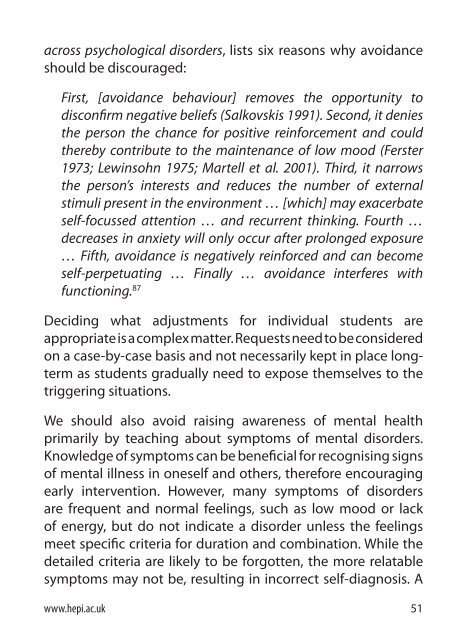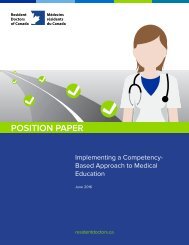The invisible problem? Improving students’ mental health
2cU9ATf
2cU9ATf
You also want an ePaper? Increase the reach of your titles
YUMPU automatically turns print PDFs into web optimized ePapers that Google loves.
across psychological disorders, lists six reasons why avoidance<br />
should be discouraged:<br />
First, [avoidance behaviour] removes the opportunity to<br />
disconfirm negative beliefs (Salkovskis 1991). Second, it denies<br />
the person the chance for positive reinforcement and could<br />
thereby contribute to the maintenance of low mood (Ferster<br />
1973; Lewinsohn 1975; Martell et al. 2001). Third, it narrows<br />
the person’s interests and reduces the number of external<br />
stimuli present in the environment … [which] may exacerbate<br />
self-focussed attention … and recurrent thinking. Fourth …<br />
decreases in anxiety will only occur after prolonged exposure<br />
… Fifth, avoidance is negatively reinforced and can become<br />
self-perpetuating … Finally … avoidance interferes with<br />
functioning. 87<br />
Deciding what adjustments for individual students are<br />
appropriate is a complex matter. Requests need to be considered<br />
on a case-by-case basis and not necessarily kept in place longterm<br />
as students gradually need to expose themselves to the<br />
triggering situations.<br />
We should also avoid raising awareness of <strong>mental</strong> <strong>health</strong><br />
primarily by teaching about symptoms of <strong>mental</strong> disorders.<br />
Knowledge of symptoms can be beneficial for recognising signs<br />
of <strong>mental</strong> illness in oneself and others, therefore encouraging<br />
early intervention. However, many symptoms of disorders<br />
are frequent and normal feelings, such as low mood or lack<br />
of energy, but do not indicate a disorder unless the feelings<br />
meet specific criteria for duration and combination. While the<br />
detailed criteria are likely to be forgotten, the more relatable<br />
symptoms may not be, resulting in incorrect self-diagnosis. A<br />
www.hepi.ac.uk 51





